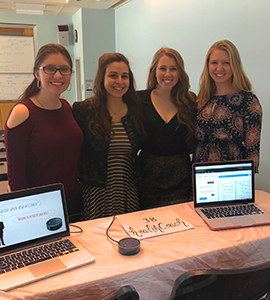Computer science students place at local hackathons
| By Stephanie Weaver

A group of Loyola computer science students, a learning community at the University, won top awards at two local hackathons this semester when teams competed at The Johns Hopkins University and Georgetown University.
Loyola’s team earned a top place at Georgetown University’s HoyaHacks in the Google cloud track for their development of an iOS app that helps the app’s user take care of houseplants. Through sensors in the soil of houseplants that communicate with the app, a signal is sent to the user’s device to notify the user (the plant’s caregiver) when to water the plant and to regulate the temperature (if is too high or too low), or if the plant has been overwatered. The 36-hour competition, which took place Jan. 27-28, afforded sophomores Chiara Maalouf and Alyssa Schilke their first experience with building an iOS app.
“Hackathons motivate you to learn something new. I had always wanted to build an app, and now I can add that to my résumé,” said Schilke, a computer science major from Pittstown, N.J. “It also shows initiative and that I can do things on my own. Computer science is always changing and demonstrating that you can continue to learn is important.”
Two weeks later, two teams of four students attended HopHacks at The Johns Hopkins University on Feb. 17-18, and both Loyola teams placed in the top 10 of all projects. The Loyola team that created an app called Project HealthCoach placed in the top 10, and the Loyola team that created Project Note also placed in the top 10 and won an award for the best user interface from Mission Data.
Sophomores Sarah Flaherty, Jen Moutenot, Chiara Maalouf, and Schilke were one of the only all-female teams to compete HopHacks. They developed a feature for Alexa, Amazon’s personal artificial intelligence assistant, called Project HealthCoach, that provides Alexa users the ability to prompt Alexa to suggest a workout. Alexa then delivers and coaches the user through a cardio, lower-, or upper-body workout, depending on user preference. The team also integrated into the new skill the ability for Alexa to share inspirational quotes to help motivate users to exercise and health facts.
“I didn’t expect it to be as fun as it was,” Flaherty, a computer science and math double major from Boston, said of HopHacks.
Prior to participating in the events at Georgetown and Johns Hopkins, none of the Loyola students had ever attended a hackathon. The Loyola teams were formed after Michael Latman, ’18, a computer science major from Baltimore, encouraged his classmates to travel to and compete in HoyaHacks, the hackathon hosted by Georgetown.
“I love building products and services, and hackathons provide a fun networking opportunity,” said Latman, who hopes to launch a career as a software engineer after he receives his diploma from Loyola in May.
A hackathon requires all aspects of the project beyond preliminary brainstorming and concepting—development, design, build, and so forth—must be done on site during the 36-hour competition. Attendees can come with a team or be placed on a team at the hackathon. The university hosting the competition often provides the sleeping arrangements and food. At the end of the second day, teams submit their projects and present them to a panel of judges, who are typically representatives of companies like Google.
For the students, hackathons provide a platform for students apply technical skills outside their coursework, to build their résumés, and to network with their peers from other institutions—as well as with the tech companies who often sponsor and attend the competitions to scout for talent and ideas.
“There’s excitement bouncing off everyone during these events. It’s cool to see what everyone else comes up within 36 hours and to get to know your peers and other people in the computer science field,” said Maalouf.
In addition to participating in more local hackathons, the students hope to host a hackathon at Loyola during the next academic year.